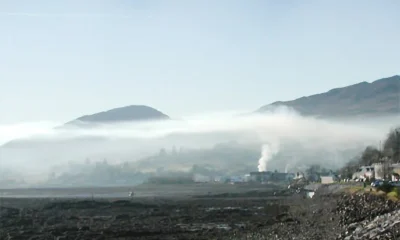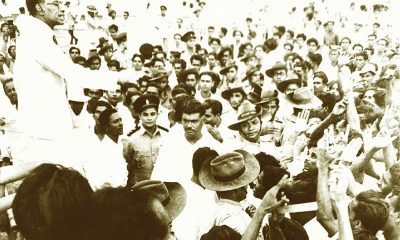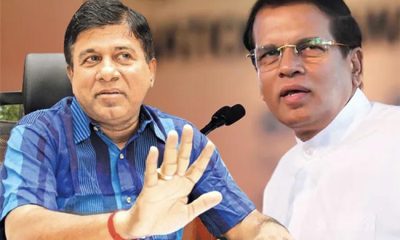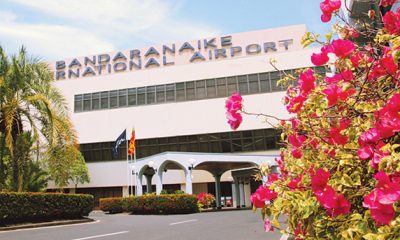Editorial
Sinners stoning sinners

Monday 27th November, 2023
The SJB has commenced collecting signatures for a public petition as part of a campaign to have those who are responsible for the current economic crisis stripped of their civic rights. Given public resentment, which is palpable, the SJB may be able to obtain hundreds of thousands of signatures for its petition, but the chances of its political venture yielding the desired results are remote; the Rajapaksas and their cronies are controlling Parliament. The SJB seems to be thinking that the ongoing campaign will help it gain some traction, but that move could turn out to be counterproductive because the Opposition politicians are not free from blame for the economic crisis.
The SLPP leaders are directly responsible for the country’s bankruptcy. The Mahinda Rajapaksa government indulged in wasteful expenditure, invested heavily in vanity projects, and did precious little to prevent the misappropriation of public funds. Corruption became the order of the day under that regime. The Gotabaya Rajapaksa administration totally mismanaged the economy, ruined the agricultural sector with its disastrous organic farming experiment and the ill-conceived blanket ban on agrochemicals, resorted to excessive money printing, did not make a serious effort to arrest the rapid depletion of foreign currency reserves and refused to seek international assistance to straighten up the economy until it was too late.
All SLPP MPs including those who have broken ranks with the government must be held accountable for the current economic crisis; even the dissidents among them supported the wrong policies of the Gotabaya administration until they fell from grace. Similarly, besides those who, the Supreme Court has said in a recent judgement, contributed to the current economic crisis, there are many others who made a tremendous contribution to the country’s bankruptcy, which was the culmination of a process that lasted for years under successive governments.
The SJB parliamentary group members who were in the Yahapalana government, which consisted of the UNP, the SLFP, the SLMC, etc., cannot absolve themselves of the blame for the current crisis. The UNP-led UNF administration did not care to reduce public debt. Instead, it slashed fuel prices and granted unusually high pay hikes to the public sector workers with the view to winning the 2015 general election. It neglected national security, and failed to prevent the Easter Sunday carnage, which entailed an enormous economic cost besides claiming more than 270 lives. The 2019 terror strikes, which crippled tourism, adversely impacted the country’s foreign exchange reserves.
The SLPP keeps saying that the Yahapalana government (2015-2019) worsened the national debt by borrowing USD 12.5 billion in sovereign bonds; nearly USD 7 billion were raised in just 15 months from early 2018 to mid-2019; out of that amount only USD 2 billion had been settled by the end of 2019. It will be interesting to see what the UNP, and its offshoot, the SJB, have got to say to this. Besides, the Yahapalana government allowed its cronies to enrich themselves at the expense of the economy. The Treasury bond scams are a case in point.
Above all, no less a person than Justice Minister Dr. Wijeyadasa Rajapakshe has revealed that the abolition of the Exchange Control Act No 24 of 1953 owing to the introduction of the Foreign Exchange Act No 12 of 2017 has stood unscrupulous exporters and other such elements in good stead. Most export proceeds are not repatriated, Minister Rajapakshe has said, adding that according to his information some exporters have hoarded about USD 56.5 billion offshore.
SJB MP Dr. Harsha de Silva has, in a recent television interview, sought to dispute Minister Rajapakshe’s claim, arguing that the new exchange control laws were intended to enable Sri Lankan businesses to expand abroad. But they certainly benefited racketeers more than anyone else. The new Foreign Exchange Act, inter alia, converted some criminal offences under the previous law into civil ones for the benefit of some crooks.
Thus, criminal cases that had been filed previously lapsed, and legal action was not instituted against the offenders concerned anew for obvious reasons; about 30 persons including the kith and kin of UNP and SLPP leaders are believed to have benefited from the new Act, which the SJB politicians voted for when they were in the Yahapalana government. The abolition of tough foreign exchange control laws contributed to the depletion of the country’s forex reserves and the current economic crisis.
The political parties that resorted to terrorism and/or supported terrorists are also guilty of having contributed to the ruination of the country’s economy. The economic cost of the JVP’s reign of terror in the late 1980s is hard to estimate due to the multifaceted nature of the repercussions of the mindless violence, which crippled the country. The TNA, created by the LTTE, functioned as the latter’s mouthpiece. It must also be held responsible for the damage the LTTE inflicted on the economy to the tune of billions of rupees. When the members of the current parliament accuse one another of having ruined the economy and call for punitive action, it is a case of sinners stoning sinners.
Editorial
Rides into the jaws of death

Wednesday 14th May, 2025
It never rains but it pours. Less than 48 hours after Sunday’s tragic accident, where an SLTB bus careened off a winding road and plunged down a precipice near Kotmale, killing 22 passengers and injuring 35 others, a private bus veered off the road, injuring 30 passengers, in Kandy, on Monday night. Thankfully, there were no fatalities. The mishap has been attributed to a brake failure. The Grim Reaper has been in overdrive on Sri Lankan roads.
The police are reported to have appointed a committee headed by SDIG Ajith Rohana to probe Sunday’s fatal accident. It is hoped that the committee members, who are senior police officers, will conduct a thorough investigation, and action will be taken, based on their findings and recommendations, to prevent road accidents.
No sooner had Sunday’s accident had occurred than some SLTB officials claimed that the ill-fated bus had experienced a sudden brake failure while negotiating a bend. But an inspection of the vehicle, or what remains of it, has reportedly revealed that it experienced no mechanical defect. Some media reports have said the driver of the bus had been working for more than 12 hours continuously and was fatigued. The SLTB is overstaffed, and it defies comprehension why its workers have to exert themselves to the point of burnout.
Safety regulations require that heavy vehicle drivers work for only about six hours a day lest they should be fatigued and drowsy. Road safety experts inform us that most road accidents occur due to human error—drivers become either reckless, distracted or fatigued; due to the circadian rhythm, most drivers become drowsy between midnight and 7:00 a.m. and between 2:00 a.m. and 4:00 p.m. This is believed to be the main reason for most crashes on expressways as well as other roads. It has to be addressed as a national priority to prevent crashes and make roads safe.
As for drowsiness or sleep-related road accidents, which have become a significant concern, there is a need for more rest areas along the expressways. Besides, technology provides solutions. There are electronic devices that detect signs of fatigue or distraction of drivers and alert them to prevent accidents. Modern vehicles come fitted with them, and some drowsiness detection systems can be retrofitted to older vehicles to help save lives. Making such technologies available at affordable prices should be part of any road safety programme. Most of all, measures should be adopted to ensure that heavy vehicle drivers are well-rested and sober before getting behind the wheel, and all vehicles must be inspected to ensure their roadworthiness.
Meanwhile, the police should reveal what action they have taken against the NPP activists who parked buses on the Southern Expressway illegally on May Day. A few days prior to that incident, the police had fined the driver of a bus carrying a group of schoolchildren for the same offence, we are told. If the culprits are allowed to get off scot-free because they are NPP supporters, a very bad precedent will be set, and the government’s approval rating will plummet further. Sadly, the culture of impunity, which the present-day leaders promised to do away with, persists.
President Anura Kumara Dissanayake, taking part in a television interview a few days before the recent local government polls said those who were responsible for the expressway incident would have to face legal action. He also said they may have been compelled to stop on the expressway as the rest areas had been full of vehicles. If so, they should have taken the next exit, had lunch and re-entered the expressway. Nothing can be cited in extenuation of the serious offence they committed.
The success of any programme to ensure road safety hinges on the strict enforcement of traffic laws. Impunity undermines public trust and compromises road safety efforts.
Editorial
Dances with Thieves

Tuesday 13th May, 2025
The title of today’s comment was inspired by the name of an award-winning 1990 film, Dances with Wolves, which is the sobriquet given to the protagonist, Lt. John Dunbar, by a Native American tribe because of his close interactions with a wolf he befriends. We were reminded of that epithet on seeing the JVP-led NPP waltzing with those it condemned as thieves before last week’s local government (LG) polls. The NPP government deserves the moniker, Dances with Thieves.
The morality of ruling politicians in Sri Lanka flies out of the window at the first sign of trouble which is likely to threaten their hold on power. Likewise, the Opposition’s insatiable thirst for power takes precedence over scruples. Hence there are so many strange bedfellows in Sri Lankan politics.
Whoever would have thought that the JVP/NPP would ever stoop so low as to woo the very politicians it lumped together with their political enemies and branded as thieves? The NPP adopted and propagated a binary view of politicians, created a dichotomy between the camp it represents and others, declared in no uncertain terms that all its political rivals, including independent candidates, were thieves—horu—and asked for a mandate to rid the political institutions of those ‘rogues’ once and for all; that pledge enabled the NPP to win the presidential and parliamentary elections, last year, but it did not prove equally effective in the recently concluded LG elections.
The NPP and the SJB are vying for the control of the hung LG bodies, especially the Colombo Municipal Council (CMC). The government and its political opponents turned the recent LG elections into a contest between horu and boru; the NPP leaders including Prime Minister Harini Amarasuriya urged the people not to vote for the independent candidates as well, who, they said, were also thieves or horu. The Opposition used boru or lies uttered by the NPP leaders to discredit the government and gain some political traction.
Both the NPP and the SJB are all out to engineer crossovers to muster majorities in the hung councils while accusing each other of trying to induce defections financially. There is no such thing as a free crossover in this country, where most politicians are Mammon worshippers, and money has a mellowing effect on their principles. So, neither the NPP nor the Opposition will be able to convince the public that the members who switch their allegiance to it, if any, have acted out of conviction.
What is legally acceptable may not be morally right. So, in the non-majority CMC, the SJB may be able to secure a majority, if it is lucky, but it is without any moral right to control the council, for the people of Colombo did not give it a mandate to do so, and, above all, its mayoral candidate failed to be elected in spite of being a respected professional. Similarly, the NPP’s all-out efforts to bag the much-coveted CMC outright did not reach fruition; it failed to obtain enough votes to secure an absolute majority. The same, more or less, holds true for other hung councils.
The NPP ought to realise that its vote share is in decline nationwide, as evident from the outcome of the LG polls, which its leaders including President Anura Kumara Dissanayake himself turned into a kind of national election, and the majority of voters have backed the NPP’s rivals, who contested severally. Likewise, the Opposition cannot deny the fact that it lacks popular support to govern the non-majority LG councils.
The NPP and the Opposition must realise that the electorate has rejected both of them in the hung councils, the difference between them being only a matter of degree. They must also bear in mind that unless they read the message contained in the people’s verdict accurately and respect it, they will incur public ire. Let them be warned that public disillusionment and resentment, which is palpable, will provide a turbo boost to the rising tide of anti-politics, which almost plunged the country into anarchy in 2022. Their leaders must stop vilifying one another and testing the people’s patience, and negotiate how to navigate the hung councils out of the current imbroglio and make them fully functional for the public good.
Editorial
Address root causes of road fatalities

Monday 12th May, 2025
A tragic road accident near Kotmale claimed 21 lives yesterday and left 35 others seriously injured. Disaster struck when a state-owned bus plying from Kataragama to Kurunegala via Nuwara Eliya, veered off a winding road and plunged down a precipice. Yesterday’s tragedy has jolted politicians and officials alike into action, but it is bound to be forgotten soon. Sri Lanka lacks a proper national strategy to prevent road fatalities. Hardly a day passes without a fatal road traffic accident being reported. About 2,243 people were killed and 4,552 others seriously injured in road accidents in 2024. Of those mishaps 2,141 were fatal.
The cause of yesterday’s accident had not been established at the time of going to press. The ill-fated bus had gone out of control due to a technical fault, according to some reports, but a survivor has been quoted as saying the vehicle was speeding. One can only hope that the police, the SLTB and the Transport Ministry will conduct a thorough probe into Sunday’s accident and take action to prevent such tragedies.
A World Bank report, Delivering Road Safety in Sri Lanka; Leadership Priorities and Initiatives to 2030, reveals that ‘the high road crash fatality and injury rates on Sri Lanka’s roads undermine the economic growth and progress made over the past decade on reducing poverty and boosting prosperity’. The report says the annual crash deaths per capita in Sri Lanka are twice the average rate in high-income countries and five times that of the best performing countries in the world! Sri Lanka reportedly has the worst road fatality rate among its immediate neighbours in the South Asia region.
It has been revealed that many drivers operate while being impaired by alcohol or drugs. In 2021, then the government disclosed that about 80% of the private bus drivers in Colombo and its suburbs were under the influence of drugs while on duty. The situation must be more or less the same where other heavy vehicle drivers are concerned. Trucks ply like bats out of hell on busy roads, terrorising other road users, making one doubt the sobriety of their drivers. The initial detection of impaired driving with visual inspection is relatively easier where drunk drivers are concerned, but the task of nabbing drugged divers is far more difficult. Hence the need for methods such as random roadside drug tests.
Complaints abound that passenger buses are not properly maintained or even regularly cleaned. Their owners try to teach politicians how to govern the country while they are doing precious little to operate their own buses in a civilised manner. Successive governments have not cared to arrest the deterioration of the SLTB, much less develop it to provide a better service. About 2,000 SLTB buses are out of service, mainly for want of spares, according to the Transport Ministry, and the roadworthiness of the ones in operation is reportedly in question. No surprise that the SLTB fleet is plagued by technical defects.
Meanwhile, a road safety expert, a few years ago, proposed that bamboo be planted on the slopes adjacent to curvy roads to stabilise soil, maintain the integrity of land in those areas and complement engineered structures such as guardrails to prevent vehicles from plunging down precipices. Nothing much has since been heard about this proposal, which deserves the attention of the authorities responsible for ensuring road safety.
Road safety experts have identified the following factors, inter alia, as the common causes of crashes on expressways and other roads in Sri Lanka: speeding, distractions, recklessness, fatigue, driving under the influence of alcohol or narcotics, inclement weather conditions, inadequate road conditions, tailgating, improper lane changes, inexperience of drivers, overtaking dangerously, poor visibility, unroadworthy vehicles, poor signage or lack of road markings and impatience or time pressure. One of the aforesaid factors or a combination of two or more of them could lead to fatal accidents on any road. So, any strategy to prevent road mishaps consists in addressing those causes.
One can only hope that yesterday’s tragic accident will galvanise the authorities concerned to make a truly national effort to save lives being lost on roads.
-

 Features3 days ago
Features3 days agoSAITM Graduates Overcome Adversity, Excel Despite Challenges
-

 Latest News7 days ago
Latest News7 days agoNPP win Maharagama Urban Council
-

 Business6 days ago
Business6 days agoJohn Keells Properties and MullenLowe unveil “Minutes Away”
-

 News3 days ago
News3 days agoDestined to be pope:Brother says Leo XIV always wanted to be a priest
-

 Sports3 days ago
Sports3 days agoASBC Asian U22 and Youth Boxing Championships from Monday
-

 Foreign News4 days ago
Foreign News4 days agoMexico sues Google over ‘Gulf of America’ name change
-

 Opinion3 days ago
Opinion3 days agoDrs. Navaratnam’s consultation fee three rupees NOT Rs. 300
-

 Opinion6 days ago
Opinion6 days agoRatmalana: An international airport without modern navigational and landing aids
























